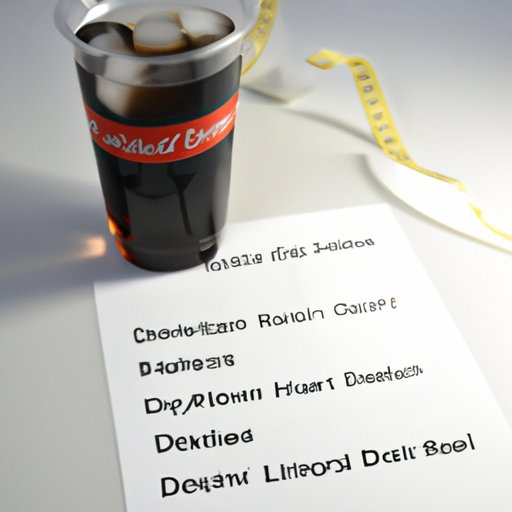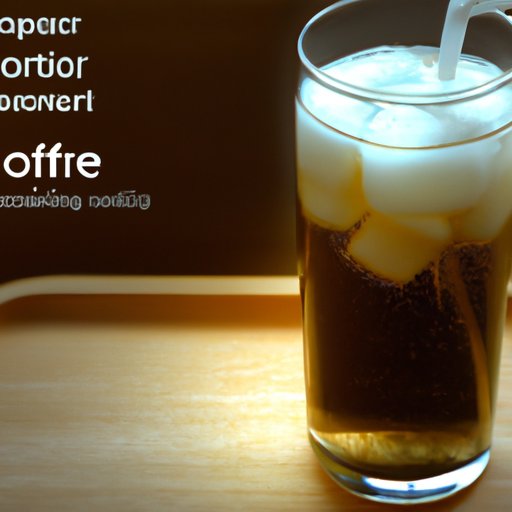Introduction
Diet soda is a popular beverage choice for those looking to cut back on sugar, calories, or both. But is it really a helpful tool for weight loss? In this article, we’ll explore the pros and cons of diet soda for losing weight, investigate its impact on metabolism, examine the latest research, and compare it to regular soda.

Examining the Pros and Cons of Diet Soda for Weight Loss
When it comes to weight loss, diet soda may seem like a helpful option. After all, it contains few to no calories and usually doesn’t contain any sugar. But is it actually beneficial for weight loss? Let’s take a closer look at some potential benefits and risks.
Overview of Potential Benefits
The main benefit of diet soda is that it doesn’t contain any calories or sugar. This makes it a great alternative to regular soda, which is high in both. According to nutritionist and author Dr. Roberta Anding, “If you’re someone who drinks several cans of regular soda each day, switching to diet soda can reduce your calorie intake significantly.”
Potential Risks
But there are also risks associated with drinking diet soda. For one, many diet sodas contain artificial sweeteners, which have been linked to various health issues. As registered dietitian Leslie Langevin explains, “Artificial sweeteners have been connected to an increased risk of diabetes, obesity, heart disease, and stroke.”
Investigating the Impact of Diet Soda on Metabolism
Diet soda may also have an effect on your metabolism. Let’s take a look at how artificial sweeteners and caffeine can influence metabolism.
How Artificial Sweeteners Affect Metabolism
Artificial sweeteners are used to give diet sodas their sweet taste without adding calories. But these sweeteners may also have an effect on metabolism. A study conducted at Purdue University found that artificial sweeteners can alter gut bacteria, which can lead to changes in metabolism and weight gain. As researcher Susan E. Swithers states, “Our research supports the idea that frequent consumption of high-intensity sweeteners may have negative effects on metabolism and could contribute to the development of metabolic syndrome and type 2 diabetes.”
Role of Caffeine in Weight Loss
Caffeine is another common ingredient in diet sodas. While caffeine can boost energy levels and help burn fat, it can also cause dehydration and disrupt sleep. Registered dietitian Amy Goodson explains, “Caffeine can act as a diuretic, which means it can cause dehydration. Dehydration can lead to fatigue, headaches, and difficulty concentrating. It can also interfere with your body’s ability to burn fat efficiently.”
Exploring How Artificial Sweeteners Affect Weight Loss
As mentioned above, many diet sodas contain artificial sweeteners. These sweeteners can have an impact on weight loss, so let’s take a closer look at some of the most commonly used ones.
Examples of Artificial Sweeteners Used in Diet Sodas
The most common artificial sweeteners used in diet sodas are aspartame, sucralose, and acesulfame potassium (ace-K). All three of these sweeteners are low-calorie alternatives to sugar, but they can still have an effect on your weight. A study published in the journal Obesity found that people who consumed diet sodas containing artificial sweeteners had higher BMIs than those who didn’t drink them. The researchers concluded that “artificial sweeteners may be associated with long-term weight gain and increased risk of obesity.”
Possible Side Effects of Artificial Sweeteners
In addition to potentially causing weight gain, artificial sweeteners may also have other side effects. According to the American Heart Association, some studies suggest that artificial sweeteners can increase blood sugar levels, raise blood pressure, and increase the risk of stroke. They may also cause headaches, dizziness, and digestive issues.

A Look at the Latest Studies on Diet Soda and Weight Loss
So far, we’ve explored some potential benefits and risks associated with drinking diet soda for weight loss. But what do the latest studies say? Let’s take a look at some recent research on the topic.
Review of Recent Studies
A number of studies have been conducted on the topic of diet soda and weight loss. One such study, published in the journal Obesity, found that drinking diet soda was associated with greater weight gain over time when compared to drinking regular soda. Another study, published in the journal PLOS One, found that drinking diet soda was associated with increased waist circumference and abdominal fat.
Analysis of Results
Overall, the results of these studies suggest that drinking diet soda may not be the best choice for weight loss. While it may help reduce calorie intake in the short term, it may actually lead to weight gain in the long term. As registered dietitian Julie Upton explains, “It appears that drinking diet soda may trigger certain metabolic or behavioral changes that lead to weight gain.”

Comparing Diet Soda to Regular Soda for Weight Loss
Now that we’ve examined the potential benefits and risks of diet soda, let’s compare it to regular soda to see which one is better for weight loss.
Nutritional Differences Between Regular and Diet Sodas
Regular soda is high in both calories and sugar, while diet soda is typically free of both. Regular soda typically contains around 140 calories per 12-ounce can, while diet soda contains 0 calories. Regular soda also contains around 39 grams of sugar per can, while diet soda contains no sugar.
Calorie Content Comparison
When it comes to calories, diet soda clearly has the edge over regular soda. However, it’s important to note that both types of soda should be consumed in moderation. Registered dietitian and nutritionist Sarah Koszyk explains, “Soda should be limited in your diet regardless of whether it’s diet or regular. Even though diet soda is calorie-free, it’s still not a healthy choice.”
Analyzing the Effects of Diet Soda on Appetite Control
In addition to its potential impact on metabolism, diet soda may also affect appetite control. Let’s take a look at how diet soda can affect hunger hormones and food intake.
How Diet Soda Can Affect Hunger Hormones
Diet soda may have an effect on the hormones that regulate appetite. A study conducted at Purdue University found that drinking diet soda was associated with higher levels of the hunger hormone ghrelin. As researcher Dr. Susan Swithers explains, “These findings suggest that consuming non-nutritive sweeteners may have the unintended consequence of inducing metabolic derangements.”
Impact of Diet Soda on Food Intake
In addition to affecting hunger hormones, diet soda may also influence food intake. A study published in the journal Appetite found that people who drank diet soda ate more food than those who didn’t. The researchers concluded that “diet soda consumption may lead to increased food intake and subsequent weight gain.”

Evaluating the Benefits of Diet Soda as Part of a Weight Loss Plan
While diet soda may not be a great choice for weight loss on its own, it can be a helpful tool when incorporated into a healthy diet. Here are some strategies for incorporating diet soda into a weight loss plan.
Strategies for Incorporating Diet Soda into a Healthy Diet
If you’re looking to incorporate diet soda into your weight loss plan, here are some tips from registered dietitian Leslie Langevin: “Drink diet soda in moderation and avoid it close to bedtime. Also, make sure to drink plenty of water throughout the day and limit your intake of processed foods.”
Other Ways to Support Weight Loss
In addition to limiting your intake of diet soda, there are other ways to support weight loss. Registered dietitian Amy Goodson suggests focusing on whole, unprocessed foods, getting plenty of exercise, and getting enough sleep. She also recommends tracking your progress and setting realistic goals.
Conclusion
In conclusion, diet soda may be a helpful tool for reducing calorie intake in the short term. However, it may also have negative effects on metabolism and appetite control, which can lead to weight gain over time. For this reason, it’s best to limit your intake of diet soda and focus on other ways to support weight loss, such as eating a balanced diet and exercising regularly.
Summary of Key Points
To sum up, diet soda may seem like a helpful tool for weight loss, but it may actually have negative effects on metabolism, appetite control, and overall health. The latest studies suggest that drinking diet soda may be associated with weight gain, so it’s best to limit your intake. If you do choose to drink diet soda, make sure to drink it in moderation and focus on other ways to support weight loss.
Final Thoughts
Ultimately, it’s important to remember that diet soda is not a magical solution for weight loss. It may provide some short-term benefits, but it’s best to focus on other strategies for losing weight, such as eating a balanced diet and exercising regularly.
(Note: Is this article not meeting your expectations? Do you have knowledge or insights to share? Unlock new opportunities and expand your reach by joining our authors team. Click Registration to join us and share your expertise with our readers.)
